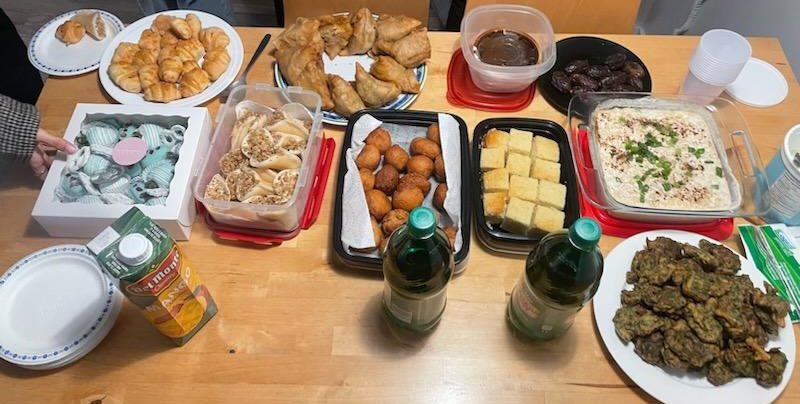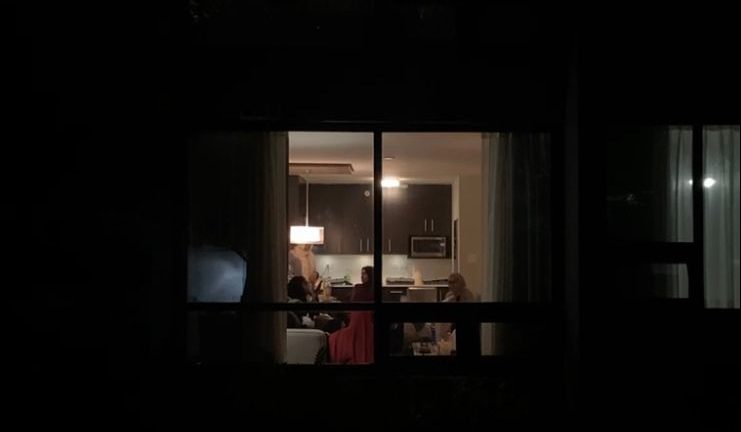Ramadan at UBC: How Muslims on campus observe the holy month
Saarah Rahman is used to celebrating Ramadan surrounded by friends and family in the United Kingdom eating traditional home-cooked meals….
Saarah Rahman is used to celebrating Ramadan surrounded by friends and family in the United Kingdom eating traditional home-cooked meals. This year, as an exchange student at UBC, she is marking the month away from home for the first time.
Rahman eventually found community on campus through Islamic Relief UBC, a student-led club and humanitarian organization that centres “Islamic morals such as compassion, community, and most of all, humanity-welcoming and serving all” which includes the Ramadan Iftars they organize.
“That’s how I met the friends that I break fasts with,” said Rahman.

Ramadan is the holiest month of the year for Muslims around the world. Cultural practices and traditions vary from country to country. Celebrations are centred on fasting, prayer, charity, community and reflection. Fasting during Ramadan is one of the five pillars of Islam and lasts from around 29 to 30 days. Fasting occurs from sunrise, called Suhoor, to sunset, called Iftar.
Rahman usually celebrates the occasion with her family back home. She describes Ramadan as a celebratory community occasion. Whether she was at home or three hours away at university, Rahman was surrounded by friends and family to pray and share Iftar with, the fast-breaking meal during Ramadan. Some of the highlights of Ramadan that brought Rahman closer to her faith were sharing unlimited Iftar with over 60 girls, staying awake until Fajr, the dawn prayer, and ordering pizza while kids would run around the Masjid.
Rahman experiences a very different kind of Ramadan at UBC.
“Here I feel like I’m kind of trapped,” she said. “I’m grateful that I have some people to celebrate Ramadan with, but it’s not going to replace my family every time I miss them and their food and their presence.”
She is still finding ways to recreate pieces of her home and her family’s Ramadan practices while juggling her obligations at school.

Rahman learned how to cook from the TikToks her mom regularly sends her of “accurate as well as authentic” Bengali recipes, with little adjustments here and there. In preparation for a potential Ramadan dish, she practised making a traditional Bengali chicken curry she shared with friends.
“It was like a tester thing of what we would actually do in Ramadan so we don’t mess up while none of us are eating.” Rahman plans on hosting a Bengali food night for her Muslim and non-Muslim friends.
Undergraduate student Yomna Omer, who has been at UBC one year longer than Rahman, shares the serendipity of finding a Muslim community in her first year.
“I thought it would be very lonely and hard. But having the Muslim Students Association, having my friends over here as well, a lot of students were going through the same thing as me. We’re all here alone. So we ended up having Iftars together. And that kind of replaces families.”

Over the past two years, Omer has had the opportunity to attend student social events organized by the Muslim Student Association (MSA). She says she feels lucky to have found community so early on in the year.
“From there, we started to go to a lot of events together, go to prayer service together, have Ramadan. All these religious events that you wouldn’t be able to have unless you have a Muslim community.”
Obstacles for students balancing praying, studying and fasting
Omer says there are several barriers that her and her Muslim friends face during Ramadan on campus, like the lack of study spaces near prayer rooms.
She suggests that having a dedicated study space and prayer room in one building would allow Muslim students to pray, study and fast comfortably.
“A lot of my friends are studying at IKB throughout the day and whenever there’s prayer time, you have to make the whole walk towards Wesbrook building and then if you’re leaving your stuff over there, you have to make sure that someone is watching over it,” said Omer.
Although Muslim students utilize the multifaith prayer rooms at Wesbrook building, which is the closest prayer space to IKB and Koerner libraries, the lack of multipurpose rooms dedicated to students studying in between classes and prayers, in the same building, makes it difficult to balance all three.
“It’d be nice to have a study space in Wesbrook building because we end up spending most of our day [there] when you don’t have classes or you have a three-hour gap between your classes. We end up spending most of the time at the musalla. But it becomes chaotic when people are sitting on the ground studying, others are praying, others want to talk with their friends,” said Omer.
Something Omer also noticed during her first-year was the lack of access to stoves and minimal kitchen appliances for first-year residences which make it difficult for students to prepare Suhoor, the pre-dawn meal.
“So not only do first-year students miss out on family meals but are also unable to cook or replicate a part of that experience during their first Ramadan alone,” Omer said.
For students like Omer and Rahman, the month coincides with exam season at UBC, making celebrations harder for students. However, Rahman was able to ask for accommodation. “I asked to have an exam kind of moved and they were pretty accommodating about it,” she said.
Rahman says that not many students are aware that you can get accommodations for religious holidays and are “forced to write an exam on your religious holiday when really you don’t need to.”
The UBC policy for religious accommodation states that “students who are scheduled to attend classes or write examinations on holy days of their religions to notify their instructors in advance of the holy day of their wish to observe it by absenting themselves from class or examination. Instructors provide opportunity for such students to make up work or examinations missed without penalty.”
Rahman says UBC could do a better job of advising students that they can be accommodated. She suggests the university should “release emails telling Muslims that they can move their exams.”
Building welcoming spaces for Muslims on campus
Lulu Jama, co-founder of the Black Muslim Collective (BMC) on campus, has lived away from home since 2016. Jama, who calls Saudi Arabia home, has navigated secular spaces for the past several years and has learned a thing or two about cultivating community.
“[This year] it’s been intentional in making sure that the spaces that we create are not only welcoming but also ensuring that we are honouring one another’s Islam and honouring God in the process.”
Jama says the intention behind the BMC’s Ramadan events this year is minimizing harm and cultivating a space in which every Muslim student can feel seen, “regardless of their background, ideology, sect.”

The BMC organized several Ramadan events scheduled for the month including a volunteering day with the Muslim Food Bank, a lecture on Black History in Islam by Ustadh (teacher) Mustafa Briggs, Iftars, community-led Halaqas, also known as Islamic/Quran study sessions, as well as a cultivating a culture of care event led by BMC students in collaboration with UBC’s Centre for Community Engaged Learning that addressed mental health barriers and accessibility.
“Our rationale, or at least mine and within the BMC, is to provide spaces for people to gather. Let people know that there’s a space that they can come to if they want to connect and meet one another,” said Jama.
For Muslim students, it is about belonging.
“As long as you walk in, and there’s something you see that you can connect with. That’s where we know what’s good. It’s calculated in that respect as well, to make sure that everybody can find that place.” said Jama.
